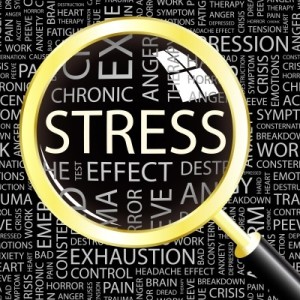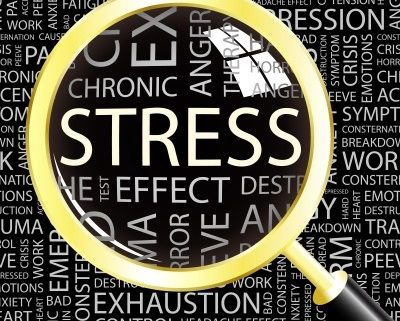Stress Awareness Month
 April is Stress Awareness Month! This month is dedicated to increasing awareness of the causes and coping methods related to stress. Stress affects everyone in some way or another. Whether you feel stressed over a deadline at work, the responsibility of planning a party, or long-term stress over things you have trouble coping with, stress comes with negative side effects.
April is Stress Awareness Month! This month is dedicated to increasing awareness of the causes and coping methods related to stress. Stress affects everyone in some way or another. Whether you feel stressed over a deadline at work, the responsibility of planning a party, or long-term stress over things you have trouble coping with, stress comes with negative side effects.
Is all stress the same?
No, not all feelings of stress are the same. There are 3 defined types of stress.
Acute stress: This is the most common type of stress which is caused by day-to-day life obstacles. Examples of these stressors include an approaching deadline, car troubles, and so on. This is a short-term stress and will not affect you long term. You are bound to experience acute stress at various points throughout life but it is very manageable and will pass.
Eustress stress: This is another type of short term stress that is associated with a positive response to stress. You may feel eustress when you are planning a party, getting a promotion at work, or striving to meet a goal that you just haven’t reached yet. In the short term, this type of stress can be beneficial because the response is often positive. However, experiencing this type of stress, or any form of stress, for a long period can be unhealthy.
Distress: This is a dangerous form of stress which is associated with harmful side effects. It is often experienced long-term and is associate with the inability to cope with life events such as the death of someone close to you or financial struggles. Distress may cause headaches, anxiety, fatigue, depression, and disturbances to typical eating and sleeping patterns.
How does stress negatively affect the body?
Stress may affect each individual in different ways. These are common side effects associated with stress:
| Increased blood pressure | Chest pain
|
Headaches |
| Light headedness | Sweating
|
Muscle tension |
| Unintentional weight change
|
Nausea | Changes in appetite |
| Constant fatigue or weakness | Nervous habits such as fidgeting
|
Anxiety |
| Irritability, anger, or defensiveness
|
Panic attacks | Depression |
| Mood swings | Forgetfulness
|
Disturbed sleep patterns |
| Changes in appetite such as emotional eating or lack of appetite
|
Difficulty focusing or reduced productivity
|
Feelings of loneliness, worthlessness, or overwhelm |
What is the best way to manage stress?
| Stress management will be different for everyone but it is important not to turn to food when you are stressed. Rather than binge eating on comfort foods like snacks and ice cream, remember these tips for relieving and managing stress.
|
| Do these things to relieve stress:
Stress-busting foods– While you should not turn to food to drown your sorrows, certain foods and nutrients have been noted to help decrease stress levels and should be included in your meals:
Exercise – Moving your body and getting some endorphins running through your body will help decrease levels of stress.
Practice yoga and meditation – These are both great stress relievers that have been proven to decrease stress and increase productivity.
Get out of your own head – Sometimes you just need to leave your thoughts behind. Try stepping out for fresh air, reading a book, listening to music, or making or viewing art.
Visualize serenity and happiness – Focusing on happy thoughts will take you away from your current stressors.
Stick to your daily rituals and routines – By staying consistent with day-to-day routines, you will not be letting your stress take over your life. When you let stress interfere with your life, it is a lot harder to recover.
Get a good laugh – Chatting with friends or family can help you sort through your stress plus they probably know how to make you laugh. Playing with pets or watching a funny movie will also help release feel-good hormones.
|
| Don’t do these things when you’re stressed:
Turn to food – While the foods mentioned above are known to combat stress, resist emotional eating. Typically, emotional eating will lead to indulging in comfort foods that are high in sugar, salt, or fat. Not only will that lead to uncomfortable physical side effects like stomach pains or bloating, these foods are often high in calories and will not be satisfying. In fact, eating too much sugar will give you a temporary sugar high which may increase your heartrate and intensify your symptoms! Aside from physical symptoms, emotional eating has negative psychological effects which will cause you to feel bad about yourself.
Engage in vices – For some people, binge eating is their go-to habit when feeling stressed. For others, their comfort is found in alcohol, tobacco, or drugs. These habits are unhealthy and destructive and in the long run they will likely make you feel worse, not better.
Hibernate – You may feel tired or depressed when you are stressed out, leading you to stay in bed and sleep to ignore your stress. While regular sleep is important, sleeping the time away day after day will not help. Sticking to your normal routines will help you stay on track and keep from falling behind in your responsibilities.
Dwell on it – You don’t want to completely ignore your stressors but dwelling on them is also pointless. Rather than obsessing over what is causing your stress, put that energy into resolving the cause of stress! Making a list of your stressors and evaluating how to handle or resolve them will relieve your stress faster than anything else. |
| Can stress be avoided? |
| While it is inevitable that you will face stressors throughout life, is it possible to minimize the amount of unnecessary stress in your life. Revisiting previous stressful situations, worrying over things you cannot control, engaging in and obsessing over worst-case scenario thinking, or procrastinating important tasks are all causes of stress that you can control. If you catch yourself stressing over these things, practice activities to clear your mind and keep the negative thoughts out.
|
Your turn to take action: Take personal time to manage your stress in a healthy way. Share your most trusted method of relieving stress, without turning to food, in the comment section.


Leave a Reply
Want to join the discussion?Feel free to contribute!